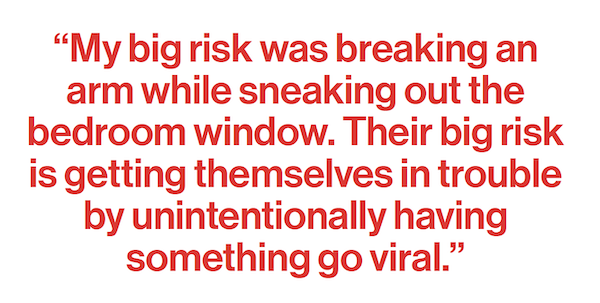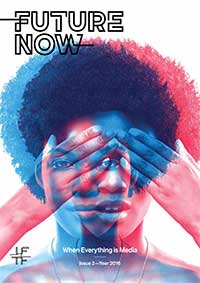Future Now
The IFTF Blog
Keep Out!
An Interview with Danah Boyd
 Young people embrace and pioneer new strategies for communicating with each other that the rest of us just don’t “get.” But we know they shape tech adoption and use in ways that others eventually follow. In a future world of ambient communications, where control remains a dilemma and concern for all, teenagers may already be leading the way forward.
Young people embrace and pioneer new strategies for communicating with each other that the rest of us just don’t “get.” But we know they shape tech adoption and use in ways that others eventually follow. In a future world of ambient communications, where control remains a dilemma and concern for all, teenagers may already be leading the way forward.
Hailed by Fortune as the “reigning expert on how young people use the Internet,” danah boyd has been observing youth on the frontiers of the digital community for over a decade. She sat down with Future Now to share her current research on how less-privileged youth are using social media today.
How are teenagers navigating online privacy?
Around ten years ago I began looking at how young people were navigating privacy. I realized that the adult rhetoric about privacy and control of information was not how young people thought about privacy at all. For them privacy isn’t about controlling information, it’s about controlling a social situation. This is a different way of looking at what we mean by control. It also creates an interesting question: How do you control a social situation?
There are certain pillars that are essential to this. One is that you have to have a meaningful sense of agency. Young people are always looking for innovative ways to have agency. A second key thing is that you need to understand the context in which you are operating. Technology keeps shifting the context. We’re not sure if we’re talking to our friends or if we’re talking to everybody. And third, young people need to have a set of skills—technical as well as social—that allows them to respond to a social situation with a sense of control.
What online dynamics do you see between adults and young people?
One of the biggest tells of privileged youth is that they know how to navigate adults [in positions of power]. Privileged young people constantly have to perform for adults—that’s how they get ahead. It means they have these separate worlds—the adult world and the peer-friendly world—and there’s all of this risk that goes into negotiating the peer-friendly world without being caught by the adult world.
The reason I distinguish between privileged and less privileged is that less-privileged youth don’t know how to navigate adults. Their world is about avoidance. One of their biggest challenges when they’re dealing with social media is to do everything possible to avoid, which is one of the reasons real-name culture is so much more part of the privileged world. Privileged youth know they’re performing for the college admissions officer. For less-privileged folks, it’s, “Oh, hell no, I’m not having a cop look over my shoulder.”

Everyone is talking about algorithms and how we’re making inferences and discovering patterns about people. What are your thoughts on this?
For most young people it’s something to game, not something to take seriously. I know young people who purposely game Google’s AdWords to get their friends to receive funny messages. Write a bunch of things related to babies in a message, and your friend will start getting diaper ads. It’s interesting that they see the systems as something to play with.
There’s a play in New York called “Privacy,” with Daniel Radcliffe. One of the things they do is ask everybody to open up Airbnb on their phones. They ask everyone to look at a particular rental and to shout out what the price is. People looking at the same rental shout out different prices. There’s this fascinating moment in the room when everybody gasps. What you see individually is so different than what you can see collectively. How do we start to see collectively?
Wow. I didn’t know that Airbnb did that.
I didn’t know either until I saw the show. When we’re online, do we know how our online activity affects our pricing? Not really.
I think it’s interesting that young people are aware of the way that they’re being tracked, and that they turn it into a game.
Yes, they’re poking and prodding at things.This is actually why we old people are lame. We don’t poke and prod anymore. Young people are coming to it for the first time, wondering, “Why is that happening?” Click, click, click. They’re exploring and experimenting.
What is really impacting young people’s lives as they move into adulthood?
They’re experimenting with a whole set of languages and processes that are different than what we grew up with. A classic example is dating. A teenager who is flirting with somebody might spend 45 minutes writing the most casual 160 characters of text that they can possibly write. They write it ahead of time, because they don’t want the dot, dot, dot to show. That’s just too embarrassing. So they first have to write it somewhere else.
They’re writing this anxiously produced text. Now, is that much different than standing in front of your mirror, practicing what you’re going to blurt out the first time you run into someone you think is cute? Not really, but they’re working through it as a textual means as opposed to a verbal means. Then they’re going to sit there anxiously, thinking, “What’s the response? Did I screw it up?” They practice a lot of textual communication over verbal communication.
I’d say one of the biggest impacts for middle and upper class youth in the United States today is the lack of autonomy and independence. That whole culture of jumping on your bike and being home by dark is gone. Now they are taking reputational risks rather than physical risks. My big risk was breaking an arm while sneaking out the bedroom window. Their big risk is getting themselves in trouble by unintentionally having something go viral.
 FUTURE NOW—When Everything is Media
FUTURE NOW—When Everything is Media
In this second volume of Future Now, IFTF's print magazine, we explore the future of communications. In our research process, we traced historical technology shifts through the present and focused on the question, “what is beyond social media?”
Think of Future Now as a book of provocations; it reflects the curiosity and diversity of futures thinking across IFTF and our network of collaborators. It contains expert interviews, profiles and analyses of what today’s technologies tell us about the next decade, as well as comics and science fiction stories that help us imagine what 2026 (and beyond) might look and feel like.
For More Information
For more information on IFTF's Future 50 Partnership and Tech Futures Lab, contact:
Sean Ness | [email protected] | 650.233.9517



